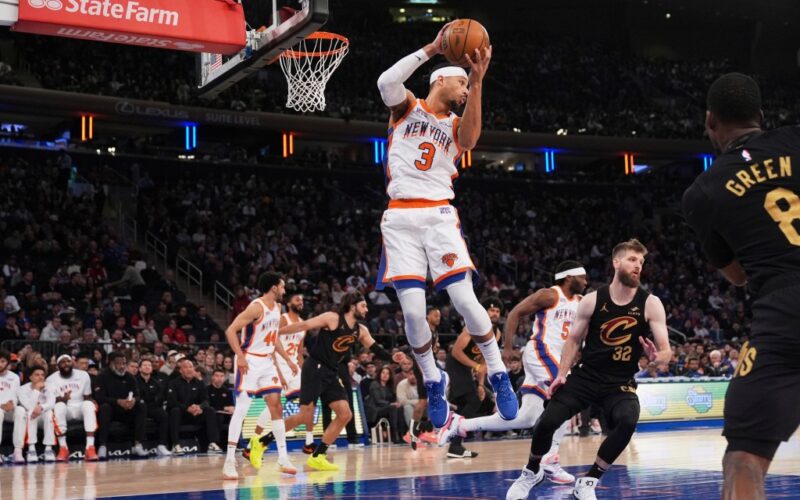BIRMINGHAM, Mich. — Josh Hart doesn’t box out.
Yet somehow, he finished the season as the best non-center rebounder in the NBA — a 6-4 force on the glass defying logic and size.
At least until he explained it after Knicks practice at Seaholm High School on Saturday. Then it all made perfect sense.
“I haven’t boxed-out since like high school. My philosophy is just go get the ball,” Hart said, grinning. “I think it depends — in terms of my defensive rebounding — it depends on who I’m guarding.”
Because Hart usually checks guards, he starts possessions out near the perimeter. That gives him a full head of steam to crash the glass. And because he doesn’t box out, his eyes stay glued to the ball — not a man — giving him an edge most players don’t have.
“If it’s a guard, I’m usually always going [full-speed to the rim] every time,” he said. “And that’s part of the reason why I don’t box-out, right? Because if you tell a guard turn and box-out and make sure this guy doesn’t get the ball, he has no idea where the ball is gonna bounce.”
Hart described it perfectly: while others are blindly pinning bodies, he’s seeing opportunities.
“We did that several times, where he’ll turn and box-out, and I’ll get the rebound just ‘cause it’s right next to him right next to his head. And if he just turned and looked at the ball, he would have got it.”
It’s not just guards, either. Even when a big is roaming, Hart trusts his instincts.
“If I have a big on me, and they’re roaming, I’m usually able to get like a free run in. So sometimes it depends.”
The results speak for themselves. Hart averaged 9.6 rebounds during the regular season, grabbed seven rebounds each in Games 1 and 2, and snagged 11 in Thursday’s Game 3 win over the Pistons.
He knows the matchup matters. Guarding Tim Hardaway Jr., Tobias Harris, Ausar Thompson or Malik Beasley affects his rebounding flow.
“If I’m guarding Harris or Thompson or someone that’s in the post or in the corner, I’m in a little bit better position [to crash the glass],” he said. “But if it’s someone like a Hardaway or Beasley, sometimes you make that adjustment putting me on those guys, and then you know my defensive rebounding might dip because I’m on the perimeter more.”
BATTLE OF THE BOARDS
The Knicks regained control of the series with a 118-116 victory in Game 3.
But the rebounding margin? Still a problem.
The Pistons won the battle of the boards in all three games so far — 37-36 in Game 1, 48-34 in Game 2, and 43-40 in Game 3. And even though the Knicks won on the road on Thursday, no one overlooking the gap on the glass.
“Yeah, the gap was tighter [in Game 3]. It was better, but we still lost [on the boards],” Hart said. “We got to make sure we have a good emphasis on the glass.”
The Knicks’ offensive firepower gives them a margin for error most nights. But come playoff time? Hart knows the math is brutal: Win the boards, win the game.
“Sometimes we’re lucky we can get away with losing the rebounding battle, but that’s something that we want to win every night,” he said. “Especially getting offensive rebounds, getting extra shots, limiting them to one shot.”
And the big picture?
“A big part of winning is your defense, your rebounding, and keeping your turnovers down,” head coach Tom Thibodeau said. “That puts you in position to win. You have to be the strongest, you have to finish strong, finish everything. Challenge shots, rebound, make a second, third, fourth, fifth effort.”
INJURY NOTES
Injury updates loomed large after practice.
Starting center Mitchell Robinson did not participate due to an illness. He’s officially listed as questionable for Game 4.
On the other side, Detroit may get some frontline help: Backup center Isaiah Stewart (right knee inflammation) was upgraded to questionable after missing Games 2 and 3.
For a series that’s already become a brawl at the margins, every rebound — and every healthy big man — matters.








